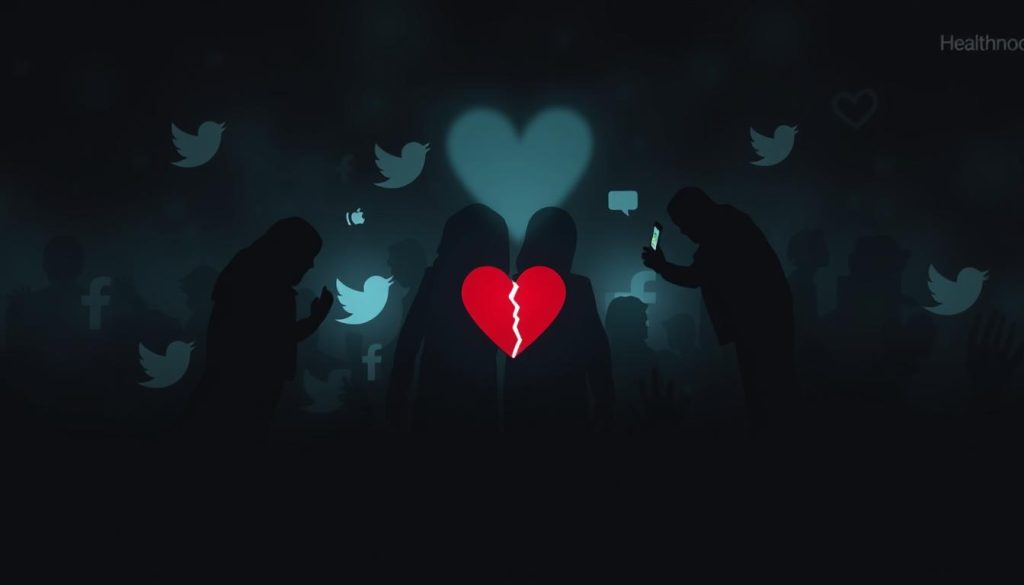Social media is a big part of our lives today, especially for teens. But, it raises a big question: How does it affect their mental health? This article will look into how social media impacts teens’ minds and feelings.
Key Takeaways
- Social media has a big impact on teens’ mental health.
- Using social media a lot can make teens feel anxious, sad, and worried about their looks.
- Being bullied online and comparing ourselves to others can hurt our self-esteem and mental health.
- It’s important to understand social media and use it wisely to help teens stay mentally healthy.
- Dealing with social media’s challenges needs help from parents, teachers, and mental health experts.
Exploring the Intricate Relationship
Let’s dive into how social media affects teen mental health. It’s key to know the digital world our youth live in. Social media is everywhere, changing how teens interact and live their lives.
From how often they use it to the dangers of too much, we’ll explore it all. This section aims to uncover the complex ties between social media and teen mental health.
Understanding the Digital Landscape
Today’s teens live in a digital world unlike any before. Social media is a big part of their lives, where they express themselves and connect with others. But, this world also has dangers, like the pressure to look perfect online.
Prevalence of Social Media Usage
How much teens use social media is important to understand its effects. Studies show they spend a lot of time on platforms like Instagram and TikTok. This can lead to problems like online addiction and the need for a digital detox.
“The digital landscape has become a complex web that our teens must navigate, and understanding the prevalence of social media usage is the first step in addressing its impact on their mental health.”
The Impact of Social Media on Teen Mental Health
Teenagers spend a lot of time online, which worries many. Social media can harm their mental health. Issues like cyberbullying, body image problems, and self-esteem are common.
Cyberbullying is a big problem. People online can be mean without facing consequences. This makes teens feel alone, scared, and sad. It can hurt their confidence and self-worth a lot.
Seeing perfect bodies on social media is also bad. Teens might feel bad about themselves. They might even start unhealthy eating habits to look perfect.
Too much time on social media can also hurt teens. They might feel anxious or depressed. It’s hard for them to balance their online and real lives.
We need to help teens deal with these issues. Parents, teachers, and mental health experts should work together. We need to teach them about digital safety and help them feel better online.

| Impact of Social Media on Teen Mental Health | Prevalence | Recommended Solutions |
|---|---|---|
| Cyberbullying and its effects | According to a recent study, 59% of teenagers reported being the victims of cyberbullying. | Implement comprehensive anti-bullying policies, provide counseling and support services, and educate teens on online safety and responsible digital citizenship. |
| Body image issues and self-esteem | A survey found that 90% of teenage girls felt pressure from social media to achieve a certain body type. | Promote body positivity, encourage media literacy, and connect teens with mental health professionals who can help build healthy self-image and self-esteem. |
| Overall mental wellness | Studies show that excessive social media use is linked to higher rates of anxiety, depression, and social isolation among teenagers. | Encourage a healthy balance between online and offline activities, teach time management skills, and provide resources for mental health support and coping strategies. |
Navigating the Challenges
Exploring the link between social media and teen mental health is key. We must tackle cyberbullying and body image issues. This helps our youth deal with the digital world better.
Cyberbullying and Its Effects
Cyberbullying has become a big problem with social media. It hurts teens’ feelings and makes them feel alone. We need to help teens fight back against online bullies.
Body Image Issues and Self-Esteem
Seeing perfect images online can harm teens’ self-image. It makes them feel bad about themselves. We should teach them to love themselves and take breaks from social media.
| Cyberbullying Effects | Body Image Concerns |
|---|---|
| Feelings of isolation and anxiety Decline in self-worth and self-esteem Increased risk of depression and suicidal ideation | Feelings of inadequacy and low self-esteem Increased anxiety and body dissatisfaction Potential development of disordered eating behaviors |
By facing cyberbullying and body image issues, we can help teens. They will learn to use social media wisely and stay strong online.

Conclusion
Social media and teen mental health are closely linked. We see problems like cyberbullying and body image issues affecting teens. These issues are real and need our attention.
We think we can help teens have a better relationship with social media. By focusing on digital wellness, we can help teens manage their online lives. This way, they can focus on their mental health too.
To improve things, we need to encourage teens to take breaks from screens. They should find hobbies offline and use social media wisely. Parents, teachers, and communities must also help. Together, we can support teens in the digital world.
FAQ
What are the primary ways in which social media can impact teen mental health?
Social media can harm teen mental health in many ways. It can lead to cyberbullying, body image problems, and feelings of isolation. It can also cause anxiety and lower self-esteem.
Too much time on social media can mess up sleep patterns.
How prevalent is social media usage among teenagers?
Most teens spend hours daily on social media. This constant online presence affects their mental, emotional, and social growth.
What are some of the specific effects of cyberbullying on teen mental health?
Cyberbullying can seriously harm teen mental health. It can cause anxiety, depression, and low self-esteem. In extreme cases, it can even lead to suicidal thoughts.
The online nature of bullying makes teens feel trapped and helpless.
How can social media contribute to body image issues and self-esteem challenges in teenagers?
Social media’s idealized content can make teens feel bad about themselves. It can lead to body image problems and self-doubt. Teens may feel pressured to look like the perfect online models.
Comparing oneself to others online can also hurt self-esteem and mental health.
What strategies can teens and their families employ to promote a healthier relationship with social media?
To improve digital wellness, set limits on social media use. Encourage offline activities and hobbies. Practice mindfulness and self-care.
Seek help from trusted adults or mental health professionals when needed. Open communication and teaching coping skills can also help teens deal with online challenges.












Leave a Reply